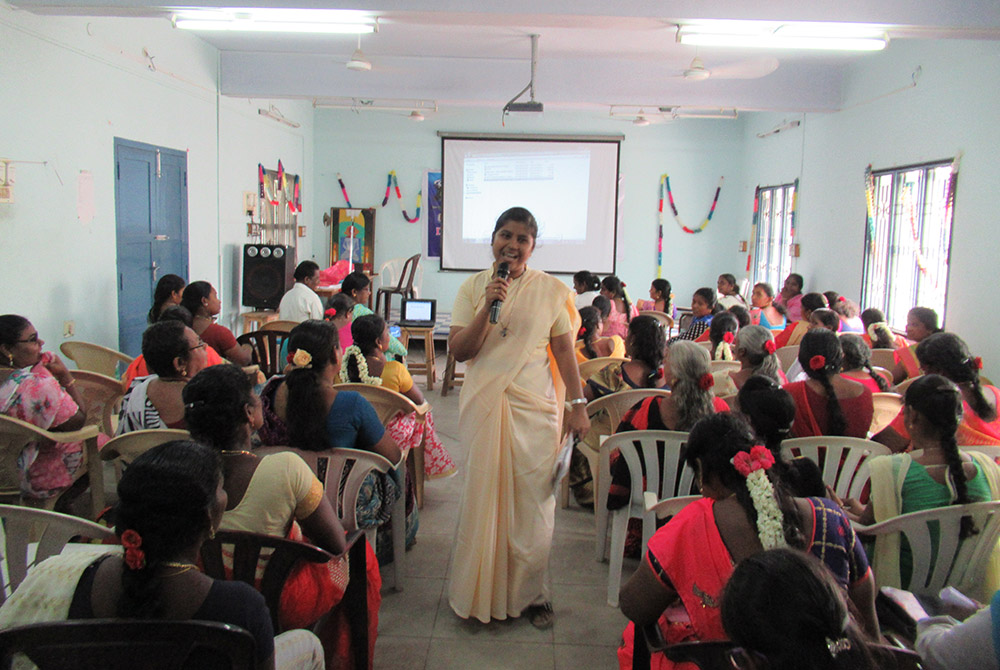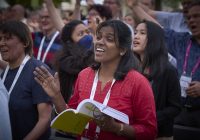For our issue on the 150 years of international work in the church of Swedem, through what is now called Act Svenska kyrkan, we asked friends and colleagues in different countries to tell us how the worldwide church is visible where they are. Robancy Helen in Tiruchirappalli, Tamil Nadu, India, sent us this reply. She is an sssociate of the South Asia Forum for Freedom of Religion or Belief and a freelance journalist. She started out in academia and has a Ph D in English literature, and now her focus is more on gender issues and the empowerment of Dalit Christians in India.
***

The Church has always been a mother, caring for and nurturing its children to the fullest. The role of the Church in India is countless. The contribution of the missionaries to Indian society has shaped the nation and helped it grow economically, socially, and politically. Indian society is indebted to the Christians, and we are still grateful to the Church for their contribution to education, health care, social development, and other spheres.
India is a country of diverse cultures and multi-religious traditions, and the people of other faiths have high regard for the Christians as they are peace-loving people. Christian missionaries instituted schools, health care, and social work centers and uplifted them. They treated them with dignity and equality. When missionaries came to India, they not only concentrated on evangelization but were also saddened to see the cultural, social, and other forms of disparities that existed in Indian society. Side by side, they transformed the lives of the people. When people died of hunger, the missionaries reached out to them with empathy and compassion.
I come from a village in the coastal area of southern Tamil Nadu state, where 99% of the people are Christians. They were converted to Christianity because of the Jesuit missionary priest Saint Francis Xavier, and they kept their faith alive even after five hundred years.
I was always taught to have faith in God and to love my neighbors. Though the people are ordinary fishermen, they do not compromise their faith in anything in life. They are generous and say that it is in giving that they see God in all that they do. I was educated and brought up in the care of the Catholic nuns in the village, where I learned to be kind and meek towards the poor and the needy. The church was the place where I got the opportunity to execute my leadership qualities and my Christian values and principles. The Catholic nuns in my village identified my talents and groomed me to become what I am today. It was from the Bible and the Christian faith that I realized the importance of treating everyone equally and with dignity.
The Holy Bible taught us to treat everyone equally and to follow the theology of equality. It is in this verse that I found that God created everyone equally. So, God created humans in his image; in the image of God, He created them; male and female, He created them (Gen 1:27).
Through formal education and my Christian faith, I realized I needed to give the best to society. I started to understand that my call is to reach out to the needy, especially women and children who are from marginalized communities. As the years passed by, I saw the untouchable practices that existed in the church and society and realized the importance of maintaining equality in the church in whatever way possible. They saw that the Dalits and the Tribals, the daughters and sons of the soil, were alienated and discriminated against because of the Varna, or caste system. They chose the option for the poor and marginalized communities. People converted to Christianity, and missionaries treated them with dignity and equality. The structure of the caste remained Latin and Greek to them, but they focused on evangelization, education, healthcare, and other developmental works.
The Dalits converted to Christianity, thinking that they would be treated equally in the Church, but surprisingly, in their newfound faith, they were discriminated against. They are casteless people and are kept outside the system, but the way they are treated is inhumane and unacceptable in the kingdom of God. The Church has always accommodated people from all walks of life. Even though the missionaries could not eradicate the inequality, they taught people to grow stronger in their faith.
Today, the spirit of love and values is lacking in the Church, but it continues to do its best to make its presence visible in every way. It was crystal clear that it is a Himalayan task to work for equal rights in the church, but my life took a turning point when I saw the existence of two churches, two cemeteries, and two hearse carts in the Christian communities. Even in the cities, people do not want to give away their caste identities. At times, the traditions and customs of Indian culture remain opposite to Christian values. Though the Indians converted to Christianity long ago, some practices are unhealthy. There is not much difference between Christians and people of other faiths when it comes to casteism. Inter-dining and inter-caste marriages among Christians are encouraged greatly.
Also, gender equality needs special attention in India. Though women are considered great in the religious texts of all religions, violence against women has increased over the years. They are treated as second-class citizens, and the attitude of the Indian patriarchal society is that women can never become equal to men. But it was Christ who always treated women and proclaimed their importance. The book of Exodus starts with the noble works of women. There is no longer a Jew or Greek; there is no longer a slave or free; there is no longer a male or female, for all of you are one in Christ Jesus (Gal 3:28).
The Indian culture and my village set-up triggered my conscience about the participation of women in the decision-making level in families as well as in the larger arena. The acceptance of women as the best administrators from home to the nation is not a well-understood concept, and focusing on gender equality has been a challenge, but working for gender equality helps me to shape my attitude and my view of looking at the world from a feminine perspective.
The transformation happened in me because of my faith and the Christian values that were instilled in me from childhood. I am grateful to the church for making me a better person and for caring for the poor, needy, and marginalized.




